






The Two Bums
This is a poem from George Milburn's book, The Hobo's Hornbook. You can also find it in a lot of old I. W. W. pamphlets and literature. It sums up a great deal of what I feel. It talks about the bum on the rod and the burn on the plush, which is just a simple way of saying that the kind of system we live in now demands that there be a poor people, demands that there be people out of work so that there will always be people willing to work for any wage.
Sure, a lot of railroad burns are parasites, but, like the poem says, they're just fleas who get an occasional bite, and you look at what those parasites at the top are chewing off. I know that there's a lot of talk these days about the welfare Cadillac; middle class people talking about those welfare gobblers down on the bottom who are afraid to do an honest day's work, and they're all driving big Cadillacs. And you hear over and over again, "Nobody ought to get something for nothing. " I've got to agree. You've got to work to eat.
I look at a factory. I see that everybody associated with that factory puts something in and they take something out. The workers put in their sweat and their skill, and they take out wages. The salesmen put in their skill and ability, and they take out commissions. The managers and foremen and people in the offices put in theirs, and take out salaries. But there's one group of people who take out more than they put in, and that more is called profit. I can't think of any other way to define it. That's a bunch of people who are getting something they didn't work for, and it's a whole lot.
If we're really concerned about people getting just what they earn, if we're really concerned about people not getting something that they didn't put in time and sweat for, let's start with the major offenders, and get rid of them. Then we'll gradually work our way down to the petty chiselers. It just makes sense.
The bum on the rod is hunted down
As the enemy of mankind;
The other is driven around to his club
And feted, wined and dined.
And they who curse the bum on the rods
As the essence of all that is bad
Will greet the other with a winning smile
And extend him the hand so glad.
The bum on the rods is a social flea
Who gets an occasional bite;
The bum on the plush is a social leech,
Blood-sucking day and night.
The bum on the rods is a load so light
That his weight we scarcely feel,
But it takes the labor of dozens of men
To furnish the other a meal.
As long as you sanction the bum on the plush,
The other will always be there,
But rid yourself of the bum on the plush
And the other will disappear.
Then make an intelligent, organized kick,
Get rid of the weights that crush;
Don't worry about the bum on the rods,
Get rid of the bum on the plush!

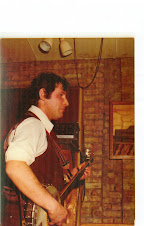


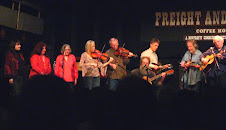
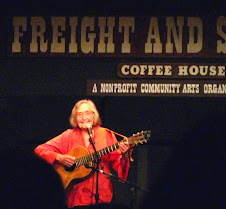
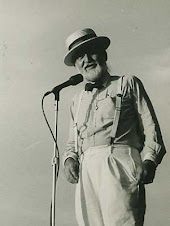



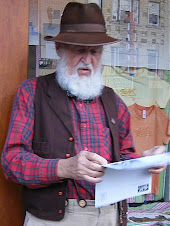



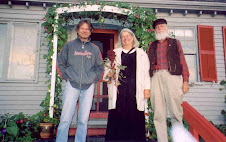

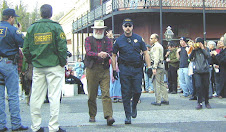


3 comments:
Duncan,
Thank you for the daily updates. It means a lot. You mentioned that you are reading the daily posts to him. Good. I’ve got a story about one of his songs that I’ve wanted to relate to him for quite some time. This is the first time I’ve had any reliable way to get the story to him.
Utah,
This is about “Hymn Song”. I actually learned it straight out of your songbook – sort of. I bought the book from you just shortly after it was published. You did a book signing/performance (more the latter than the former really) at the old Whole Earth Bookstore which used to be in Evanston, IL. I didn’t read music especially well (I still don’t), but I managed to figure out how to play “Starlight on the Rails” and “Old Buddy, Goodnight”. The lyric to “Hymn Song” intrigued me, but I didn’t get around to learning until about two years later. I heard Fred Holstein sing it. I went right home and started learning the song. I performed it for a couple of years at whatever gigs I could get back then. After a time I got diverted by other things and forgot about it.
About twenty years ago I came back to the song. It had occurred to me that it was a darned good thought with which to leave people. I’ve been closing my shows with it ever since. Over the years its meaning for me has grown to the point that, when my wife and I got married, we used it as the music for the Processional. That’s not as odd as it might sound. It was a Unitarian/Universalist ceremony.
But that’s not the story that I wanted to tell you. I’ve no doubt that at some time in the not too distant future some enterprising enthnomusicologist will figure out a way to gobble up gobs of research-grant money to study why folksingers tell stories in such a circuitous manner. But, that’s another discusion. Back to the story.
Fourteen years ago I moved from Chicago to Madison, WI. Most of the work that I’ve done locally has been of the M.C. variety. I’ve been hosting benefits and open mic’s. About five years ago the weekly open mic which I host now was dropped in my lap (which is another story for another time). There is a woman, here in Madison, named Kathleen. She is in her mid-fifties and suffers from a mild form of autism. Despite this she has managed to make something of a life for herself. She even plays two instruments – the mandolin and the pennywhistle. She doesn’t play them especially well, but she does it with so much heart that it’s hard to care much about that. The fact that she does so at all is remarkable. Kathleen has been at nearly every open mic I’ve hosted. It’s not anything about me. She goes to every open mic that she can manage to get to. Open mic hosts occasionally kid her that it may be illegal to run an open mic in Madison without Kathleen in attendance. Kathleen always laughs.
Her pennywhistle playing is, to say the least, unique. She has a tendancy to keep time with her tongue which gives her playing something of a herky-jerky quality. Sometimes it takes a couple of minutes to figure out exactly what song she’s playing. There is one exception – “Hymn Song”. At the open mic I make room for instrumental breaks from anyone who is still there and wants to jump in, as well as encouraging everyone to sing. There have been guitars, harmonicas, hammered and mountain dulcimers, accordians, keyboards, and, of course, Kathleen’s pennywhistle.
When Kathleen does a break during “Hymn Song”, it is the only time that she plays smoothly. It is the only time that she lets the music carry her along. There is something about that tune that breaks down all of her barriers and allows her to push a soothing tone and an even melody out of herself through the pennywhistle. All of her defenses are gone. There is only the strenght of purpose. I’ve seen it happen nearly every week for the last five years and it is still amazing. You’ve created something magical with that song, sir. I just thought that you should know what one of your songs can do.
Be well.
Stephen Lee Rich
Thanks again for all the updates. Keith Bednar
An amazing life, we go round and round in, eh, Utah? One of the first concerts I attended as an adult was to hear you play and tell stories in the Nevada Theatre, some 30 years ago. Your stories from that performance are such a part of my stories, the silly things I tell my kids (oh God, I'll never pick an over large zuc without thinking about stacking it for cordwood, and never think of disposing meds (I'm a nurse) without thinking 'bout squirrels and birth control pills...
And then there's Moose Turd pie..."it's good though" resonates through our house when the teenagers cook, and now they know where the line came from :-)
The last time I had the priviledge of seeing you in person we were both in the Herb Shoppe. I was far too shy to approach you and say hello, but I sure knew who you were, and was sad that as you were moving to your new home town, I was leaving my old hometown for wider horizons.
Through the blessing of discovering recently that KVMR has live web streaming, I have been, 25 years later, reconnecting with my old home town, and you seem to still be such a part of that. It rekindled many memories of your stories and what I think is such an important -- and often ignored -- part of our history. Organizing labor, uniting workers, fighting injustice (heck, RECOGNIZING injustice). For Christmas, I used up my iTunes money and downloaded a dozen songs and stories and have shared them with my children. My son, at 18, has never had to fight for anything except the tv remote, but he is at an age actively looking for his purpose. War ain't it. He is a cowboy in an age where it's hard to live the "Cowboy Way". He heard in your stories something validating, that called to him the way only old cowhands have done.
Your stories make for living history for a generation who has only benefitted from the work of labor unions and peace activists. They are real, and it delights me that my own offspring can hear them and know this.
I wish we could give you back a story to mend a broken heart. I do have one other to share, though it's not so happy. I was a late life child of a man who served in WWII as a SeaBee on an island called Tinian. He talked of it often when I was little, and had boxes of sea shells he liked to show me (gigantic!). He never said much about his time there, except that he was on the crew building landing strips on this little sandy island in the middle of the ocean. I wouldn't say he spoke of it with pride or joy, just the job he did. He died when I was an young teen, and never told me the importance of Tinian. I heard it first from you, quite by accident, when I bought one of your albums (probably at that concert at the Nevada Theater!), and heard "Enola Gay". A door of understanding between myself and my deceased father was opened, I understood something more of who he was because of a story you shared. I give that happenstance connection back to you now.
Utah, you have achieved a certain immortality as your words, ironic and ironclad, soft or scathing, paint a picture of what gives us the foundation of all that we have. Hard work, hard workers, people who hung together till they got things right, people who did what wasn't right but was asked of them, people who lived and died with a sense of purpose and maybe a sense of humor, too.
May the Sierra Sunshine warm you to the bone, may the smell of the pines fill you to overflowing, may the beautiful Yuba wash all your cares away.
God Bless you, U. Utah Phillips!
Katherine (Ledford) Davis
Post a Comment